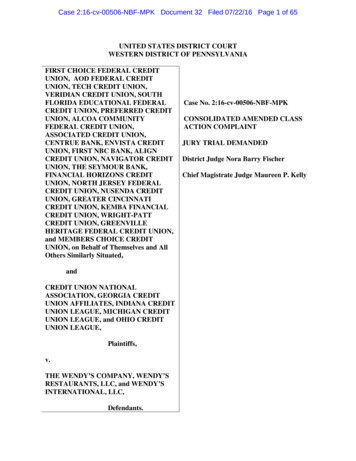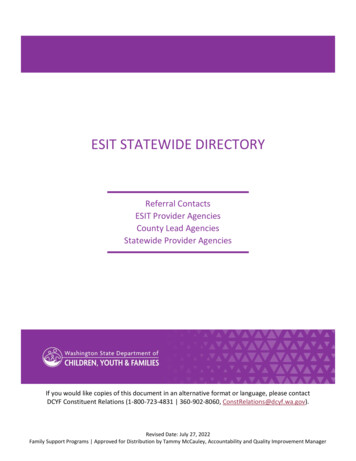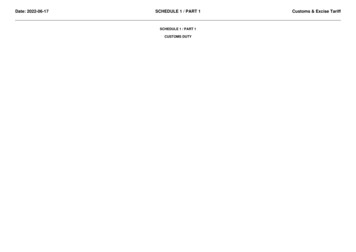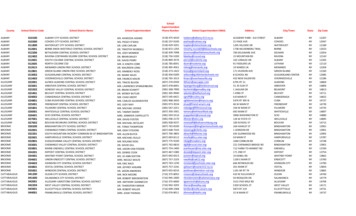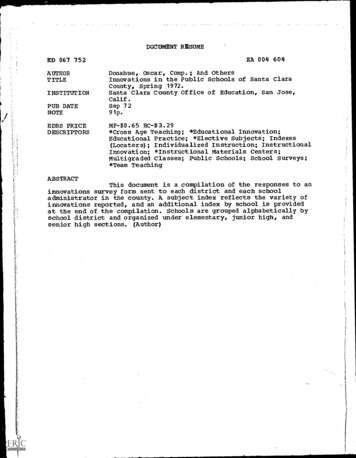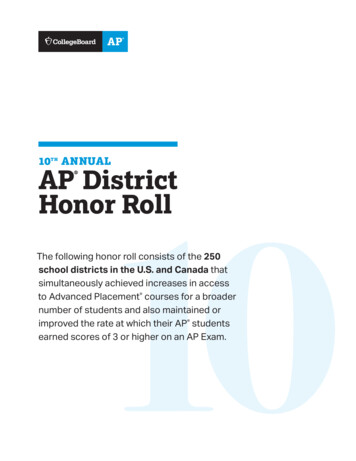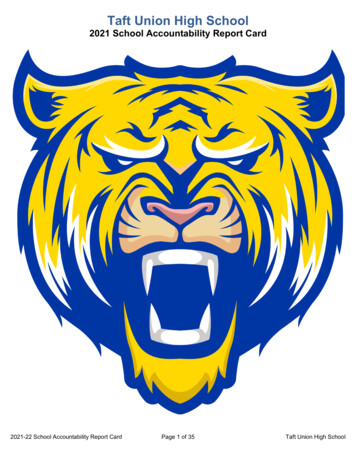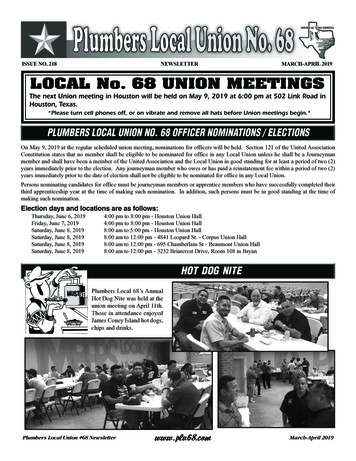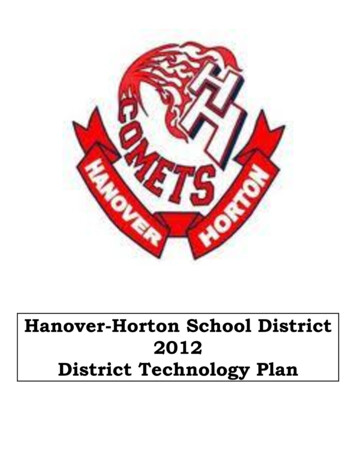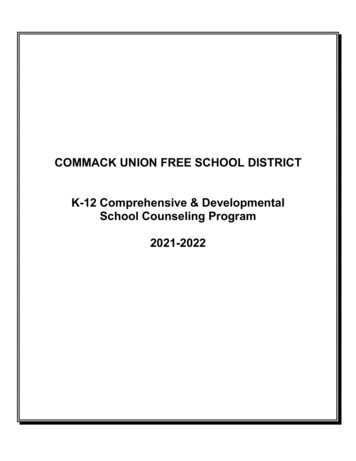
Transcription
COMMACK UNION FREE SCHOOL DISTRICTK-12 Comprehensive & DevelopmentalSchool Counseling Program2021-2022
Table of ContentsIntroduction .Commissioner’s Regulations 100.2.Commack School District Mission Statement .Counseling Department Mission Statement .Commack Board of Education Goals .Counseling Department Goals .Counseling Program Grades K-5 .Health Education and Personal Safety .Character Education .Student Achievement .Student Conduct .Student Attendance .Academic Support .Parent/Guardian Involvement .Transition Planning .College & Career Awareness .Counseling Program Grades 6-12 .Annual Individual Progress Review .Transition Planning Intermediate to Middle School .Transition Planning Middle to High School .Career Exploration .Sophomore Career Exploration .Career Readiness Programming .College Planning.Student Counseling Services .Academic Program Planning & Review .Academic Support .Behavioral Support .Parent/Guardian Involvement .New Entrant Support .Support for Students with Special Needs .Support for English Language Learners .ASCA Mindset & Behavior a/asca/home/MindsetsBehaviors.pdfCareer Development Occupational Studies Learning ments/cdoslea.pdf2
IntroductionThe Comprehensive and Developmental School Counseling Program outlined below highlightsCommack School District’s ongoing commitment to maintain high standards and provide academic,social emotional, and post-secondary support for all students in Kindergarten through grade 12.This program shall be data-driven and developed annually to include program objectives, activities,program development and maintenance planning, school counseling curriculum, evaluation methodsbased on data analysis of program results and closing the gap analysis reports to inform programimprovement, and assessment of the resources necessary to support positive student outcomes.To achieve this goal, the District is committed to ongoing efforts aimed at setting and maintaining highexpectations for all students and building the capacity for all students to succeed. This is done within asystematic K-12 framework which acknowledges the academic, physical, and social development ofpupils in distinct stages over time and the satisfaction of National School Counseling standards.Of critical importance to the District’s comprehensive effort is the role of its counseling and relatedservices components for students, families, and teachers. The explanation and coordination of theseresponsibilities K-12, are articulated in this School Counseling Program. It is intended to assisteducational stakeholders in assuring the academic and social success of all pupils.Commissioner’s Regulations 100.2a. Guidance programs1. Each public school district shall have a comprehensive developmental schoolcounseling/guidance program, for all students in kindergarten through grade 12.Each school district shall ensure that all students in grades kindergarten through twelvehave access to a certified school counselor(s).2. For all grades kindergarten through twelve, district and building level comprehensivedevelopmental school counseling/guidance programs shall prepare students toparticipate effectively in their current and future educational programs as ageappropriate. Additionally, the program shall be designed to address multiple studentcompetencies including career/college readiness standards, and academic andsocial/emotional development standards.i. Beginning with the 2021-2022 school year, in grades kindergarten through five,the program shall be designed by a certified school counselor in coordinationwith teaching staff and any appropriate pupil personnel service providers. Theprogram shall be designed for the purpose of preparing students to participateeffectively in their current and future educational programs, to provide informationrelated to college and careers, and to assist students who may exhibit challengesto academic success, including, but not limited to, attendance or behavioralconcerns. The program shall also, where appropriate, make a referral to aproperly licensed professional and/or certified pupil personnel service provider,as appropriate, for more targeted supports.ii.Beginning with the 2021-2022 school year, for students in grades six throughtwelve, certified school counselors shall provide an annual individual progressreview plan, which shall reflect each student’s educational progress and careerplans. For a student with a disability, the plan shall be consistent with thestudent’s individualized education program.3
a. An annual review of each student's educational progress and careerplans, with such reviews to be conducted with each student individually bypersonnel certified or licensed as school counselors;b. Instruction at each grade level to help students learn about variouscareers and about career planning skills conducted by personnel certifiedor licensed as school counselors, or by classroom teachers in cooperationwith school counselors;c. Other advisory and individual or group counseling assistance to enablestudents to benefit from the curriculum, to help students develop andimplement postsecondary education and career plans, to help studentswho exhibit any attendance, academic, behavioral or adjustment problemsand to encourage parental involvement, provided that advisory assistanceshall be provided by teachers or counselors, or by certified teachingassistants under the supervision of counselors or teachers, and that suchindividual or group counseling assistance shall be provided by certified orlicensed school counselors or by certified or licensed school psychologistsor certified or licensed school social workers in cooperation with schoolcounselors.4
The Commack School District Mission StatementWithin the context of a caring community of learners, our primary mission is to provide an exemplarylearning experience that will allow each child to acquire the necessary knowledge, skills, attitudes, andvalues to become a successful, contributing member within our school community and greater society.Counseling Mission StatementThe mission of the Commack Comprehensive & Developmental School Counseling Program is toprovide all K–12 students with a comprehensive school counseling curriculum centered around thedevelopment of the whole child. In partnership with parents, administrators, teachers, supportpersonnel and community members; school counselors will foster social emotional growth, academicsuccess, college and/or career readiness skills, independence and self-advocacy that will enable themto be lifelong learners and productive citizens.Commack Board of Education Goals 2021 – 2022Curriculum, Instruction, and Assessment: Support the development and on-going enhancement of a well-balanced, developmentally-appropriatecurriculum that allows all students to be prepared to accomplish their individual goals.Provide for an education in which all students can learn the social, emotional, academic, and physicalcompetencies in an environment that is as safe and healthy as possible.Continue to ensure that all students have access and opportunity to engage in diverse curricular andmultitude of extracurricular activities.District Business and Operations: Continue to support the District’s multi-year plan for the maintenance and the improvement of Districtfacilities in order to provide students and staff with a healthy and safe learning and workingenvironment.Continue to develop a fiscally conservative budget that helps maintain the integrity of Commack’sprograms and aligns with the community’s expectations.Through efforts in community engagement, explore the option of a multi-million-dollar bond issue tocontinue to support the districts capital improvement and enhancement projects.Board Governance and Advocacy: Establish a Strategic Planning Commission to engage the school community in the development of anInstructional Strategic Plan that sets the priorities and guides decisions regarding the allocation ofresources from SY21 through SY25.Continue with the District's advocacy efforts related to the best interests of students, staff, parents, andthe community.5
Counseling Department GoalsFor the 2021-22 school year, the committee has chosen the following goal to evaluate and improve. Ensure that support is provided to all students to successfully transition from middleschool to high school as developmentally appropriate in the areas of academics, andsocial-emotional wellbeing.The Commack School District Counseling personnel fully support the district’s goals. To do so, theCounseling Department will seek to: Assure academic, social and emotional success for all students as per the outcomes ofall counseling efforts.Promote the development of principled, global citizens who are knowledagble, openminded, caring and reflective.Assist in the development of interpersonal communication skills, problem solving andinquiry skills.To adopt a “Whole School, Whole Community, Whole Child” model to improve studentoutcomes.Provide timely and effective communication with students, parents, teachers andadministration on all matters germane to its responsibility.Continuously educate the students and community as to the expectations of theCommack School District’s experience: including graduation requirements,assessments, and the breadth of academic, career oriented and social-emotionallearning opportunities provided through school programming.Provide and support career and college education awareness and planning at all levelsK-12.Coordinate counseling, consulting, and related services efforts of all supportcomponents within the School District.Prepare students to succeed responsibly in post-secondary education and/or theworkplace.Annually update the Comprehensive & Developmental School Counseling Program incoordination with School Counselors.6
Commack Public SchoolsSchool Counseling ProgramGrades K-5The K-5 Comprehensive & Developmental School Counseling Program is committed to meeting theSchool Counseling regulations established by New York State, as well as the American SchoolCounseling Standards for School Counseling Programs. This Plan is designed to assist students inpreparing to participate effectively in their current and future educational programs. It is focused onaddressing students’ attendance, academic, behavioral or adjustment problems, social emotionalgrowth, character education, and college and career readiness, and encourages parental involvement.7
Health Education & Personal Safety Foundation:o Program Objective: To teach students how to make decisions regarding healthy behaviors including,nutrition, healthy life choices, safety, first aid, cleanliness, the dangers of drugand alcohol use. To promote awareness of potentially dangerous situations, including the ability torealize when their personal safety is threatened, the ability to identify someonewith whom they can safely confide their feelings, and an age appropriateunderstanding of various types of abuse.o ASCA Standard: Mindset/Behavior: M1; PS-A1, PS-B1, BSMS-9 CDOS: N/A Delivery:o Activity: Instruction regarding personal safety including fire safety, stranger danger, bikesafety, road safety, and pool safety Parent notification in the event of potential risk to child’s safety Counseling Referral to outside agencies Management:o Timeline: Ongoing and as neededo Student Focus: The program’s focus is for all students in grades K – 5 and, as needed, identifiedstudents Grades K-5o Staff & Resources: Classroom teacher, Physical Education teacher, Principal, PPS staff,Psychologist, Social Worker Accountability:o Assessment: Expected outcomes will be assessed by classroom teachers’ observations ofstudent responses and parental feedback.8
Character Education Foundation:o Program Objective: To provide opportunities for students to learn the essential social and emotionalskills needed to lead healthy and productive lives.o ASCA Standard: Mindset/Behavior: M1-3; BSMS1-10, BSS1-9 CDOS: Standard 3A Delivery:o Activity: Individual counseling Group counseling Building Assemblies – monthly meetings that focus on social and emotionallearning and the character trait of the month Bus intervention program 2nd Step Program – Students will gain an understanding of empathy, impulsecontrol, problem solving and anger management CAPS Caring Kids Program – a bullying and anti-violence program AVID – Anti Violence Initiative Day – students wear purple and participate inactivities that focus on anti-violence Have You Filled a Bucket Today? – students are encouraged to be bucket fillersand demonstrate good deeds at school and at home The Buddy Bench- promotes student interaction, social awareness, and empathyfor others Arts in Education Programs – special programs provided throughout the year forstudents often pertaining to social and emotional well being Management:o Timeline: Annually and ongoingo Student Focus: The program’s focus is for all students in grades K–5.o Staff & Resources: Psychologist, Social Worker, All Faculty Members, Classroom Teacher, Parentmembers of Arts in Education Accountability:o Assessment: Student progress will be assessed through teacher and parent feedback.9
Student Achievement Foundation:o Program Objective: To enable student to participate effectively in their current and future educationalprograms, to be aware of academic expectations, and demonstrate continuousacademic achievement as they progress through elementary school.o ASCA Standard: Mindset/Behavior: M5; BLS1,6,9 CDOS: N/A Delivery:o Activity: Dial 4 Kindergarten screening Entrance exam Parent orientation and questionnaire Systematic Reading Testing – Fountas and Pinell Systematic Reading Testing –Fountas and Pinell Instructional Support Team Meeting for placement in AIS CSE/504 Annual Review Meeting – meeting to provide feedback and progressupdates to help determine the appropriateness of each student’s IEP or 504 Plan State assessments Cognitive Aptitude Test TerraNova Math Management:o Timeline: Annually and ongoingo Student Focus: The program’s focus is for all students in grades K–5.o Staff & Resources: Accountability:o Assessment: Student achievement will be assessed and reported using the format of tri-annualreport card. Satisfactory progress of pupils receiving systematic remedial instruction will beevaluated through State assessments and teacher evaluation. Students will experience a positive transition to the next grade based on facultyand administrative assessment.10
Student Conduct Foundation:o Program Objective: To foster improved student behavior, adjustment to school, and development ofpeer relationshipso ASCA Standard: Mindset/Behavior: M1,3; BSMS 1-4,7 CDOS: N/A Delivery:o Activity: Classroom instruction regarding appropriate school behavior Teacher/Pupil conference Teacher/Parent/ Principal conference IST Referral Referral to outside agencies Peer Mediation Management:o Timeline: Annually and ongoingo Student Focus: The program’s focus is for students in grades K–5 and students exhibitingbehavioral and adjustment problems.o Staff & Resources: Principal, Mental Health Staff, Second Step Program Accountability:o Assessment: Improved student behavior will be assessed by the reduction of reporteddisciplinary problems. Improved student adjustment, improved academic performance, and improvedpeer relationships will be noted by the classroom teacher and school staff.11
Student Attendance Foundation:o Program Objective: To assist students who exhibit attendance problems.o ASCA Standard: Mindset/Behavior: M3; BLS4, BSMS5,8,10 CDOS: N/A Delivery:o Activity: Student attendance reporting Student conferences Parent conferences Management:o Timeline: Ongoing as neededo Student Focus: The program’s focus is for students in grades K–5 who are excessively absent.o Staff & Resources: Attendance Personnel, Mental Health Staff, Infinite Campus Accountability:o Assessment: Improved student attendance will be assessed by daily, monthly, and year-endreports12
Academic Support Foundation:o Program Objective: To help students who exhibit academic problems.o ASCA Standard: Mindset/Behavior: M2,5,6; BLS1,3,4,6 CDOS: N/A Delivery:o Activity: Parent/Teacher conferences Instructional Support Team meetings Pupil/Teacher conferences Pupil/Social Worker conferences Referral to CSE for evaluation AIS Support Services – Students are identified through standardized test gradesand teacher recommendations. Supports include AIS classes and monitoringservices Student Support Services Universal Screenings (RTI) Management:o Timeline: Annually and ongoing as neededo Student Focus: The program’s focus is for students in grades K–5 who exhibit academicproblems.o Staff & Resources: Classroom teachers, Parents, Mental Health Staff, Principal Accountability:o Assessment: Improvement of students’ classroom work and homework will be assessed byclassroom teacher Improvement in report card grades will be noted on trimester report13
Parent/Guardian Involvement Foundation:o Program Objective: To encourage parent involvement and promote awareness and support ofeducational programs and goals established for their children.o ASCA Standard: Mindset/Behavior: M3,4; BSS3,6,7; BLS9 CDOS: N/A Delivery:o Activity: Parent workshops highlighting various areas of the curriculum School/parent communications, report cards/newsletter, informal communication,and feedback forms Parent Advisory Committees Parent/teacher conferences Book Fair Family Nights – Bowling, Bingo, Carnival, Sports Night, Play & Concert Management:o Timeline: Annually and ongoingo Student Focus: The program’s focus is for all students in grades K–5.o Staff & Resources: Administration, Principal, Faculty, Mental Health Staff Accountability:o Assessment: Parental awareness and support of educational programs and goals will beassessed by parental feedback. Parent initiated contact will be assessed by teacher and administrativeobservation. Parental understanding of school services and programs will be assessed byparental feedback.14
Transition Planning Foundation:o Program Objective: To facilitate a seamless transition to primary school for incoming Kindergartenstudents. To facilitate a seamless transition to Intermediate school for incoming third gradestudents.o ASCA Standard: Mindset/Behavior: M2,3; BLS7, BSMS10, BSS9 CDOS: N/A Delivery:o Activities (Primary): Kindergarten Orientation, Visitation Day K-5 and “Back-to-School Night” Transition Night Bus ride to visit Kindergarten class Pre-School Teao Activities (Intermediate): Student Visit Day Students attend play at Burr or Saw Mill Parent Orientation Management:o Timeline: Annuallyo Student Focus: The program’s focus is for all students entering Kindergarten and third grade.o Staff & Resources: School Counselors, Principal, Classroom Teachers, Mental Health Staff,Specialty Teachers, AIS Staff, SEPTA Accountability:o Assessment: The transition program and activities will be assessed based on parent feedbackand teacher observations.15
College and Career Awareness Foundation:o Program Objective: To raise awareness about future careers as they relate to students’ areas ofstrength and interest.o ASCA Standard: Mindset/Behavior: M4; BLS7, BSMS10 CDOS: Standard 2 Delivery:o Activity: Field Trips to explore careers Shadow Day Graduation Walkthrough Arts in Education Programs Management:o Timeline: Annuallyo Student Focus: The program’s focus is for all students in grades K-5.o Staff & Resources: School Counselors, Peer Leader Students, Classroom Teachers, Mental HealthStaff, Specialty Teachers, PTA Accountability:o Assessment: Student and/or parent feedback, teacher observation16
Commack Public Schools Comprehensive & DevelopmentalSchool Counseling ProgramGrades 6-12The Commack Counseling Department is dedicated to assisting students in meeting their personal,social and academic goals, while preparing them for post-secondary college and career aspirations.School Counselors play an essential role in the development of students and their ability to meetsuccess during their various educational and personal transitions. The unique and developmentalneeds of these young adolescents are met by providing them with the tools to develop into productiveand involved members of their school and community. This process includes informing students andparents of graduation requirements and academic programs that will allow students to enroll in achallenging and enriching curriculum. The Counseling Plan will meet New York State regulations bydelivering the activities in this guide with clear and measurable objectives. Highlights of the programinclude, but are not limited to: An annual review of each student’s educational progress and career plansInstruction at each grade level to help students learn about various careers and careerplanning skillsIndividual or group counseling to encourage all students to benefit from the CounselingcurriculumAssistance to students who exhibit attendance, academic, behavioral, emotional ortransitional challengesSupporting and including parental involvement at all stages17
Annual Individual Progress Review Foundation:o Program Objective: To provide an annual review of each student’s educational progress andcollege/career goals. Including General Education, Special Education and ELLstudents. To assist students in identifying their academic abilities and guide them in goalsetting. Students will be able to relate their academic achievement to future educationaland career opportunities.o ASCA Standard: Mindset/Behavior: M2, M5; B-SM4, B-SM5, B-LS6 CDOS: Standard 1 Delivery:o Activity: Individual conference to review students’ overall academic progress and careerinterests. Course selections and four-year planning will be discussed. Management:o Timeline: Annuallyo Student Focus: The program’s focus is for all students in grades 6 – 12.o Staff & Resources: The School Counseling Department Accountability:o Assessment: Evidence of the successfulness will be determined by counselor notes andinformation documented in students individual counseling folder.18
Transition Planning Intermediate to Middle School Foundation:o Program Objective: Students will become socially, emotionally and academically adjusted to themiddle school.o ASCA Standard: Mindset/Behavior: B-SMS1, B-SMS8, B-SMS10, B-SS2,3,5,9CDOS: N/A Delivery:o Activity: 5th into 6th Curriculum Night Counselor visit to Intermediate Schools Ambassador Program 6th Grade Orientations Counseling Lessons – 3R Character Lessons Student articulation through the Teaming Model Management:o Timeline: Annually, Character Lessons quarterlyo Student Focus: Students in grades 5-6o Staff & Resources: The School Counseling Department, Building Administration, CurriculumLeaders, Classroom teachers, Social Workers, Psychologists, Parents, StudentLeaders Accountability:o Assessment: Evidence of student success will be determined by counselor notes andinformation documented during the year and during individual annual review.19
Career Exploration Foundation:o Program Objective: To provide career guidance to students at each grade level so that they canattain the knowledge and skills necessary to understand career paths, secureemployment and perform work to the best of their ability. Students will become familiar with Naviance and complete multiple CareerInterest Inventories. Students will conduct specific and individualized research regarding possiblecareers paths and college majors.o ASCA Standard: Mindset/Behavior: M4, M6; B-LS7 CDOS: Standards 1 & 2 Delivery:o Activity: Career Guidance lesson through Business and Family Consumer Scienceclasses, using Naviance Student platform. Naviance Cluster Finder – Grade 7 Naviance Strengths Explorer – Grade 8 Naviance Career Interest Inventory – Grade 9 Naviance Road Trip Nation – Grades 8 & 9 ASVAB Exam – Grades 11 & 12 Management:o Timeline: Annually in a group setting.o Student Focus: Students in Grades 6 – 12.o Staff & Resources: The School Counseling Department Business and FACS Teachers Naviance Student Career Portfolio Career and Internship Coordinator Accountability:o Assessment: Student feedback on career planning and lesson completion in Naviance Career assessment surveys through Family and Consumer Science course andNaviance program. Monitoring of Naviance Career Plan completion.20
Sophomore Career Exploration Meetings Foundation:o Program Objective: To assist students in learning about various careers, skills needed for specificcareers, reflect on skills and interests when researching careers and colleges. Students will be able to describe his/her own career related interests andpossible future career paths. Students will be able to describe relationships between careers/college majorsand required education achievement levels.o ASCA Standard: Mindset/Behavior: M4, M6; B-LS7 CDOS: Standard 1 Delivery:o Activity: Annual meeting in small groups to discuss career interests and how this relatesto college search and selection process. Management:o Timeline: Annually in the fall.o Student Focus: The program’s focus is for all students in Grade 10.o Staff & Resources: The School Counseling Department Career Plan College and Career Resources Accountability:o Assessment: Review of interest survey results by student and counselor. Counselor guide conversations and ensure accurate placement in courses and/ortechnical programs.21
Career Readiness Programs Foundation:o Program Objective: Provide opportunities for students to meet with career representatives,community members and training programs to enhance their college and careerreadiness. Students will learn about various employment opportunities.o ASCA Standard: Mindset/Behavior: M2, M4, M6; B-LS7 CDOS: Standards 1, 2, 3 Delivery:o Activities: Career Cafe BOCES Wilson Tech Field Trips Internship Program Shadow Day College and Career Fair Management:o Timeline: Continuous throughout school year.o Student Focus: The program’s focus is for all high school students, grades 9 – 12.o Staff & Resources: The School Counseling Department Administration Student Leaders School-Business Partnership Members Career and Internship Coordinator Accountability:o Assessment: Individual program attendance and student survey feedback, including the SeniorSurvey.22
College Planning Programs Foundation:o Program Objective: Students will develop personal college and career plans related to their interestsand achievement. Students will develop skills to succeed at the post-secondary level.o ASCA Standard: Mindset/Behavior: B-LS1, B-LS3, B-LS4, B-LS7 CDOS: Standard 3 Delivery:o Activities: College Visitation Days College Onsite Programs College Days College and Career Fair Junior Class
systematic K-12 framework which acknowledges the academic, physical, and social development of pupils in distinct stages over time and the satisfaction of National School Counseling standards. Of critical importance to the District's comprehensive effort is the role of its counseling and related . Counseling Standards for School Counseling .
